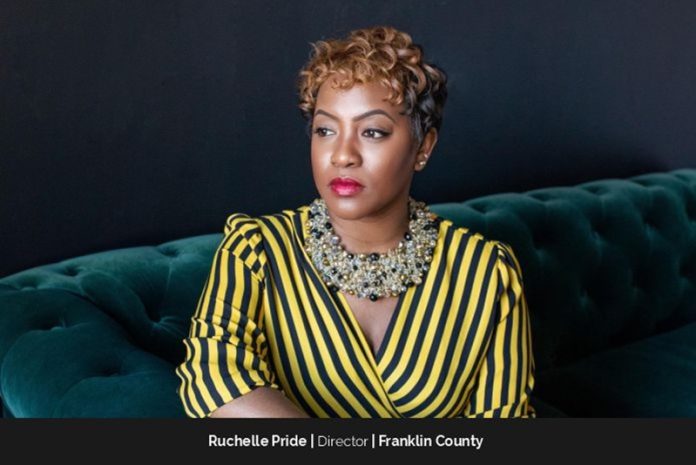Ruchelle Pride, Director/Interim Director at Franklin County, is a dedicated leader renowned for her impactful work in justice policy and economic development. With a career spanning over two decades, she has championed systemic change, racial equity, and community well-being. Her visionary leadership integrates strategic planning with a commitment to human rights, aiming to create lasting positive change in both local and broader contexts.
A Trailblazing Path Through Criminal Justice and Economic Development
Ruchelle’s path to becoming the Interim Director of the Franklin County Economic and Development Agency has been marked by a profound dedication to public service and a commitment to supporting marginalized communities. With 17 years of experience in the criminal justice field, she has worked across local, state, national, and international levels.
Ruchelle started her career in juvenile justice as a detention officer while also pursuing extensive studies in criminal justice, corrections, and public safety. She earned a bachelor’s degree in Homeland Security & Emergency Management from Franklin University and a master’s degree in Restorative Practices from the International Institute for Restorative Practices (IIRP).
Her transition from direct service roles to leadership saw her contribute to criminal justice, social justice, community health, and economic mobility organizations. Notably, Ruchelle became the first Black woman appointed Director by the Franklin County Board of Commissioners for the Office of Justice Policy & Programs and Court Appointed Special Advocates of Franklin County. “Being the first is never easy,” Ruchelle reflects, “but I knew it was exactly where I needed to be to blaze a trail for those who needed to see it and those who would follow.”
Ruchelle also earned certifications as a Professional Coach and Diversity Executive, focusing on the development of individuals, teams, and organizations. Her extensive experience and skill set now drive her leadership as Interim Director of the Franklin County Economic and Development Agency, where she’s spearheading change management and strategic planning.
“The two most important days in your life are the day you are born and the day you find out why.” -Mark Twain
Prioritizing Equity and Community Health in Public Leadership
Ruchelle’s leadership of the Office of Justice Policy & Programs and Economic Development & Planning at Franklin County centers on racial equity and community health. She firmly believes that “how you see people is how you serve them, so it’s imperative to have 20/20 vision within your lens of leadership.”
For Ruchelle, racial equity is “one of the most inherent human rights one can have,” and she emphasizes the importance of addressing inequities “unapologetically.” These values form the basis of her work in both agencies, guiding how programs are developed and executed.
This approach aligns with the ethos of Franklin County. As County Administrator Kenneth Wilson often says, “DEI must be a part of our DNA as people and public servants.” By making these principles the foundation of her leadership, Ruchelle ensures that Franklin County’s efforts are both effective and equitable.
“Service to others is the rent you pay for your room here on earth.” -Mohammed Ali
Pushing for Systemic Change in Justice Reform
As a key figure in Franklin County’s justice system, Ruchelle is leading the charge in advocating for prison reform and disrupting mass incarceration through several key initiatives.
At the heart of her efforts is the mission of the Franklin County Office of Justice Policy & Programs (OJPP), which is to provide “system-wide comprehensive justice planning and oversight” and to spearhead initiatives that support “smart justice, encourage diversity, equity, and inclusion while delivering quality services to the residents of Franklin County.”
In 2020, OJPP launched the Stepping Toward Justice framework, which acknowledges that “racism is a root cause of poverty, bad health, broken families, and damaged communities” and leads to the over-incarceration and underserved status of certain populations. The framework focuses on improving data collection at various intercept points in the justice system to address these issues.
It raises critical questions about racial disparities, such as “WHY is there a racial disparity in persons who commit/are charged with offenses of this type at this point in our Sequential Intercept Mapping (SIM)” and “HOW are decisions made by justice authorities” at each point of the process.
Using these metrics, OJPP presented comprehensive data reports to the Franklin County Administration, Common Pleas Court, Municipal Court, and the Franklin County Criminal Justice Planning Board. These reports highlighted significant findings, including:
- Length of stay/case processing and race inequities in arrests and jail bookings
- Probation technical violations
- Bond trends
- Likelihood of arrest multiplier
- Population and demographic density
- Jail releases by day of the week, time of day, and location
These metrics revealed the disproportionate impact on BIPOC communities, including longer lengths of stay, higher bail amounts, excessive use of incarceration for community supervision violations, and barriers to adequate legal representation. OJPP also played a pivotal role in the Stepping Up Initiative, which Franklin County joined in May 2015. It aims to reduce the disproportionate number of people with mental illness in the local jail system.
By December 2021, OJPP convened representatives from various justice disciplines to discuss progress and challenges. This collaboration led to the development of new practices, such as specialty dockets and improved inter-agency relationships, to provide alternatives to incarceration for residents facing mental health challenges.
“Injustice anywhere is a threat to justice everywhere.”-Dr. Martin Luther King Jr.
Global Perspectives Driving Local Justice Reform
Ruchelle’s involvement with the European Forum for Restorative Justice (EFRJ) has significantly influenced her approach to justice reform in the United States. During her graduate studies, she became familiar with the EFRJ, an international network connecting restorative justice practitioners, academics, and policymakers across Europe. This connection has allowed her to adopt a global perspective, emphasizing the importance of “thinking globally and acting locally.”
“Whether it’s poverty, mass incarceration, or destabilized social determinants of health,” Ruchelle says, “justice is something restorative practitioners like me fight to achieve.” By learning from European jurisdictions that have implemented progressive community policing strategies, established human-centric alternatives to incarceration, and improved conditions of confinement, she applies these innovative practices to reform local justice systems.
“The fundamental hypothesis of restorative practices is that human beings are happier, more cooperative and productive, and more likely to make positive changes in their behavior when those in positions of authority do things with them, rather than to them or for them.” -Ted Wachtel, IIRP Founder
Balancing Leadership Across Justice and Economic Policy
As a leader in both justice policy and economic planning, Ruchelle skillfully manages the strategic priorities of these two critical areas within Franklin County. She emphasizes the importance of “balance, boundaries, and delegation of duties” in her leadership approach. “As a leader of two powerhouse systems, my focus on key priorities is crucial to execute and move our county’s mission and vision forward,” Ruchelle says.
Her success relies on her dynamic team, which she views as integral to her effectiveness. “I often share that there is no me without my team,” she notes. By entrusting and empowering her team members through delegation, Ruchelle fosters an environment that supports her staff and her leadership. This helps her maintain focus and effectiveness, ensuring that justice policy and economic planning align with the county’s goals.
Expanding Access to Essential Services for Recently Released Individuals
Ruchelle is particularly proud of the Rapid Resource Centers (RRC) initiative, which she describes as a key project close to her heart. Launched in 2021, the RRC at Franklin County Corrections Center II aims to provide “immediate, equitable access” to supportive services, harm reduction education, and behavioral health treatment for individuals recently released from custody.
“This program is overseen by a licensed clinician with previous justice involvement and relies heavily on the Peer Support model and Community Health Workers,” Ruchelle explains. The multi-agency collaboration involves Primary One, Columbus Public Health, and Franklin County Public Health.
To date, over 8,000 individuals and their family members have benefited from the RRC. In October 2022, the center expanded to a 24/6 operation to offer wraparound support, respite for unhoused residents, and transportation after public transit hours.
The success of the initiative led to the approval of a second RRC location at the new James A. Karnes Correctional Facility, which promises greater accessibility, increased capacity, and enhanced collaboration. Ruchelle views this expansion as a testament to Franklin County’s commitment to supporting every resident facing barriers both before and after release.
Human-Centered Leadership Enhances Workplace Culture
Ruchelle integrates her philosophy of stewardship and service into her daily leadership practices at Franklin County. She believes that “how you see people is how you serve them,” which guides her interactions with her team.
Whenever she meets a new team member, Ruchelle schedules a one-on-one meeting to learn about them both personally and professionally. “I ask intentional questions that spark conversation and allow the interaction to be informal and organic,” she explains.
Ruchelle emphasizes the importance of making everyone feel “seen and valued.” This approach fosters a more humane workplace, blending the achievement of goals with meaningful, personal interactions to create a better workplace culture.
Ruchelle leverages her oratory skills and professional coaching certification to inspire and develop her Franklin County team. She emphasizes that effective communication depends on “how you say it, and to whom,” not just the message itself. By tailoring her communication to each person’s comprehension style and practicing active listening, she ensures clarity and alignment. Ruchelle values pausing to confirm understanding, which fosters a more cohesive and informed team.
Local Government’s Role in Advancing Racial Equity and Reducing Disparities
Ruchelle views local government as essential in advancing racial equity and addressing disparities. In 2019, Franklin County Commissioners and County Administration launched the Rise Together Blueprint for Reducing Poverty, a comprehensive plan developed with community input. Known as the “People’s Plan,” it targets key areas such as jobs, housing, health, and youth.
Ruchelle points out that the Rise Together Steering Committee has highlighted significant inequities, such as the higher incarceration rates for African Americans — 637 per 100,000 compared to 223 per 100,000 overall. To address these issues, the Rise Together Innovation Center was established to coordinate and advance the blueprint’s goals, focusing on reducing poverty and increasing equitable access to opportunities.
In 2020, Franklin County reinforced its commitment by recognizing racism as a public health crisis and embedding racial equity into its governance principles. The creation of the Office of Diversity, Equity, and Inclusion aims to tackle systemic inequities through policy reforms and training. This office is improving county processes and has conducted a Cultural Climate Audit to promote organizational inclusivity.
Guidance for Aspiring Women Leaders in Public Service
Ruchelle advises aspiring women leaders to focus on consistency, courage, and self-awareness. “Anything worth doing won’t be easy,” she says, emphasizing that consistency is crucial, courage is empowering, and remaining aware is essential.
She encourages women to be authentic in their roles and to never lose sight of their true selves amidst their work. “We are hardwired with the tools we need to be our best genuine self; our primary responsibility is to sharpen those tools along the way and share our toolkit with others.”
A Vision of Advancing Systemic Change and Equity
Ruchelle aims to drive growth and impact in her dual roles at Franklin County, focusing on systemic change and elevating the county’s national and international profile. She highlights, “The collective progress, service, and excellence of Team Franklin County has continued to garner national and international engagement.”
Her objectives include advancing racial equity by tackling disparities through strategic initiatives. Ruchelle is dedicated to reimagining community and economic development, ensuring equitable access to affordable and sustainable housing, and fostering improvements in workforce, education, and social justice.
Envisioning a Legacy of Lasting Impact and Equality
Ruchelle envisions leaving a lasting legacy by driving immediate change and planting seeds for future impact. She believes that a true legacy is created through enduring work that guides future generations. “Legacy is built by work that stands the test of time and serves as a roadmap for those to come,” she reflects.
Her ultimate goal is to ensure that human rights and dignity are upheld for everyone, irrespective of race, gender, or socioeconomic status. “Not because it’s a choice we have, but rather the only option,” she asserts.
Conclusion
Ruchelle Pride’s leadership at Franklin County exemplifies a steadfast commitment to justice and equity. Her innovative approaches and unwavering dedication are shaping a future where systemic disparities are addressed, and every resident is empowered. Through her impactful initiatives and visionary goals, Ruchelle continues to set a powerful example for future leaders, driving progress and fostering a more equitable society.





